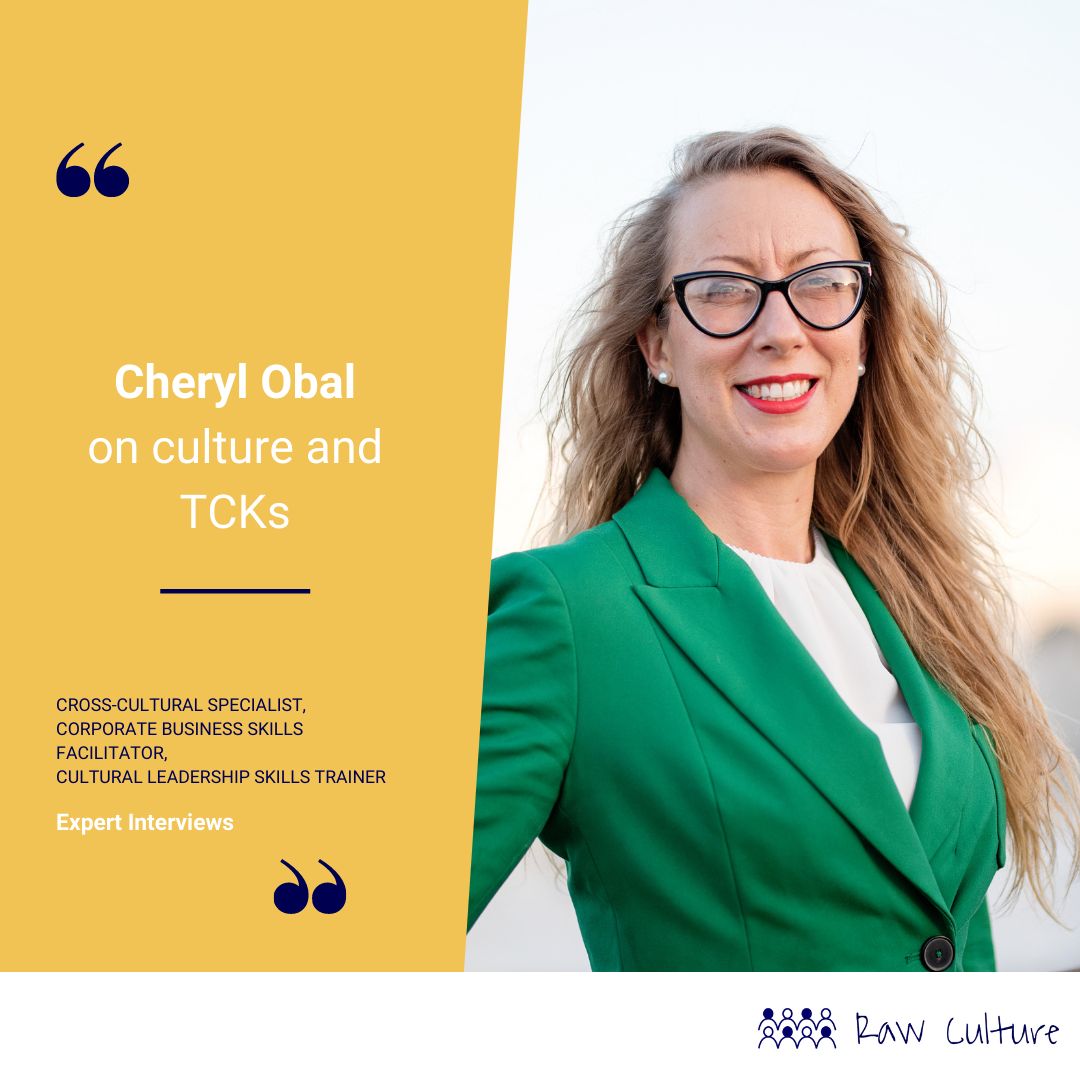Contact Us
Company Registered in Borgo Berga, Vicenza, Italy, 36100.
Registration Number (Partita Iva) 04299640245. Operating Worldwide.
JPM Business Solution
by cherylobal | Feb 15, 2022 | Expat Life, Intercultural Skills

In this interview, Cheryl talks about how she got into the cross-cultural training field, misperceptions about places she’s lived like the Middle East and Italy, TCK (Third Culture Kids), and how she loves discovering human kindness across the globe.
Weirong: The idea of this interview is to understand from people who are from professional fields on how they’re working with culture and how that has influenced their lives – raw culture.
Today here with me is my great friend also mentor and cross-cultural specialist Cheryl Obal, she focuses on particular Italy, Saudi Arabia, UAE, India, and the US and she is also a corporate business skills facilitator and a cultural leadership skills trainer.
Being part of a society that’s so often plagued by social stereotypes and misrepresentations has its drawbacks. One of them is the virtual avoidance of interactions between people of different cultures. The Internet provides a good opportunity for learning about and connecting with people from different cultures. However it can be a bit of a minefield, especially when it comes to intercultural communication, hence the need for cross-cultural trainers like Cheryl Obal.
To start off, and as today’s interview is really about culture, the first question then is:
Cheryl: Well, culture is a broad term that can be applied in many different contexts. Simply put, it’s a shared set of characteristics, ways of thinking, value systems and principles that are shared by a large group of people. Culture is not only about where you come from because culture can be influenced by all the different groups that we belong to. All the groups and smaller segments of society you belong to throughout your life influence and teach you.
These include your family, your society, your school, your profession, and many other factors.
Culture is also used in other terms, other phrases like corporate culture, organizational culture, arts and culture, etc. I think we have to be specific as cross-cultural trainers and explain what we’re actually talking about.

We’re talking about culture on different levels, including your culture of origin but also other aforementioned influencing factors throughout our lives. All together, these make building blocks and shape our value system.
Cheryl: I think the crucial moment is when you realize how much cultural values influence the way people think, and how they influence your behavior in very specific situations. Two different people can be looking at the same situation but have two completely contrasting interpretations of it. I first became aware of this in my very first professional job when I was 21 and I worked in Japan.
That was really a page-turner in my history since I was young, it was my first time abroad, and Japanese culture is very different from American culture where I came from.
I got a chance to understand their values of humility and respect for others—Japan has a wonderful, beautiful culture.
I realized in that experience that there’s a hierarchy, which I had never before been exposed to. In the place I was working, we were a team of five Americans and we could not just individually go and express ourselves to the management of the place—we were not allowed to do that.
We had to communicate through the leader of our group and that person would take our concerns forward to the leader of the Japanese group that was managing us. There was a very clear structure and protocol.
In the US there’s a sense that everybody has the right to speak out no matter what level you are.
Anybody can just walk up to the CEO of a company, sit down and express their opinion. The way to do things can be vastly different from country to country and culture to culture.

Cheryl: I was an ESL teacher (English as a Second Language). At a certain point, I simply fell into this career when I got a job with Microsoft in India in 2011 as a Culture and Communication Specialist. As part of our training, we got trained on different methodologies in cross-cultural training. These included Cultural Detective, GlobeSmart, ICS – Intercultural Conflict Styles ssessment tool, and IDI – Intercultural Development Inventory.
Through all these tools, the number one thing is to understand your own personal styles and tendencies. Then, you start to use them in your teaching and reference different theories. My time at Microsoft just opened my mind as far as cross-cultural training and knowledge. I knew that this was the missing link in my career and in my life. It changed the whole trajectory of my career.
At that point, I realized this is the information I needed 10 years ago when I started my expat journey and I started living abroad. I wish I had known these philosophies and methodologies back when I first left my home country. It would have helped my whole journey a lot more!
Cheryl: For this answer, I would like to address the fear factor about living in the Middle East. I lived in Saudi Arabia for four years, where I worked as a cross-cultural trainer at a university. It was the most amazing experience of my life, and I had the most enriching teaching experiences of my entire career.
What people think about the Middle East, they think:
– and it’s not like that at all!
It’s extremely safe, clean, and progressive in that they’re moving forward to the future towards technology and different forms of sustainable energy. Also, the people are absolutely amazing.
From day one in my teaching, people treated me in the most exquisite way. Every day they asked me how I was doing, am I settling in okay, do I need anything? They were calling me “sister.” They were treating me like their sister! At the end of the first, three-month batch of courses I did in Saudi Arabia, my students gave me the most lavish gifts that I’ve ever received in my whole career.
Living, working, and doing business in each of these countries is very different. Saudi is very different from the UAE, the UAE is built on accepting and attracting a lot of foreigners. Their population is 88% expat and of the population, 59% come from India, Pakistan, Bangladesh, Nepal, and Sri Lanka. The remaining percentage is a mix of all other nationalities of the world.
In Saudi, it’s getting to that open level. Saudi has a lot of initiatives in place like the “Vision 2030” whose goal is to diversify the economy’s dependence on oil, attract more foreign investment, and bring more expats to live there or for tourism.
Saudi is changing rapidly, and in the four years I was there:
I want to put it out there for anyone who has a fear of going there, that you can pretty much live out your life very similar to the way you live in your home country. Any place you live abroad enriches your life in countless ways, and Saudi is no exception.
Cheryl: I hear this often people say things like “Oh, the life is so slow over there isn’t it? You must be enjoying the slow pace of the lifestyle.”
Well, where I live, it’s Northeast Italy and this is a very fast-moving place. The underlying Italian values are still here: family, socializing, getting together, enjoying life, and being outside in nature are all really important to the average Italian. But people do work really hard here, and this is one of the big industrial centers which a lot of companies and factories call home.
The Veneto region, where I live, is known for the production of a lot of things from clothing to shoes, to electronics. There are many differences between the North and the South, but my experience is mainly with the North.
Often people back home think I’m over here just sipping cappuccino in a cafe and enjoying my life on the beach. No, it’s not like that—I am working a lot. People in this area, especially professionals, have long work days, usually from 8 am to 7 pm.
Those are the main misconceptions about Italy.
Cheryl: I was aware of TCKs and I had met many of them while living abroad. I had a sense that they had a lot of knowledge about the world, more than other kids their age who lived only in their home countries all their lives. They had a broader perspective of different types and more acceptance of all different kinds of people.
I would say that in conclusion, TCKs were probably the most sensitive in a good way. They are empathetic and worldly, with a broad perspective—more than other kids. TCKs have this mindset that allows them to adapt to any environment, and any type of culture or people that they work with.

TCKs – Third culture kids (TCK) or third culture individuals (TCI) are people who were raised in a culture other than their parents’ or the culture of their country of nationality, and also live in a different environment during a significant part of their child development years.
– wikipedia
On the other hand, it could also be a disadvantage to some TCKs because they are confronted with so many different cultures at once. It’s often that they have this identity crisis and that they may feel isolated.
This could be a potential downfall if kids have moved around to so many different countries. They may have difficulty understanding which one to identify with, and which set of values they belong to.
Let’s say your parents are always moving from country to country throughout your life. You might start building relationships in a certain place, and then all of a sudden you’re uprooted and have to go live in another place, and make friends all over again. This may be devastating to young minds, and although living in different countries is a great opportunity, many TCKs may not see it that way.
Cheryl: Storytelling is probably the best way to connect. On a human level, storytelling is a technique that has been used since the dawn of mankind to pass on different beliefs and different history of humankind from generation to generation. It has always been the best way to also transmit different things to people because our brain is wired to be attracted to a story. If they’re told well, stories draw you in, and you learn through the journey of the story itself.
The other reason why storytelling is so effective with TCKs is that when certain TCKs tell stories to other TCKs, they’re going to realize that they’re not the only ones going through those difficulties. When they hear the story from someone else, it immediately puts their mind at ease.
Cheryl: Cross-cultural trainers could really benefit by listening to TCKs tell their stories, and by incorporating the same stories into their lessons.
I’ve noticed throughout my whole time of being a trainer, that whenever I insert a story into a lesson, everybody’s listening to me all of a sudden. If they were fidgeting or only half paying attention, looking at their phone or something, when I tell a story everything changes and they start listening. Their attention is there, and you could hear a pin drop in the room.
Cheryl: There is one thing that always impresses me about culture. What makes me excited to live in another country, and experience the culture, is recognizing human kindness in different places. Knowing that human kindness knows no barriers—culture is not a barrier, language is not a barrier—makes me want to get out of bed every day and experience it.
I’ll give you one example. When I was in Korea, I wanted to teach a dance class. I had been teaching dance on the side, raising money for charity through my classes, and donating all my earnings from dance teaching since 2007. Almost 100 percent of whatever I earned from teaching dance was always donated to charity in all the different countries I lived in. It was my hobby and personal platform.
In 2012-13, the second time I was in Korea, I wanted to set up my dance class. I was working in the Gangnam area (remember the song “Gangnam Style”?) and I asked the owner of a gym near my office if I could teach my dance class there. The thing is I had to ask if I could use his gym for free because the idea is I’m donating for charity.
I didn’t want to have to pay to rent the room because it reduces some of the donations. Since I’m teaching for free, I also want to rent for free and then everything I collect as payment goes to charity. It’s a little bit of a complicated model and people have to trust you to know that you’re actually doing that.
I was not speaking Korean yet at that time, so I went with a translator and she explained to this guy, who I had never met, what I wanted to do. To my amazement, he said yes. Not only did he say yes, but he also gave me money every week for the charity I was donating to.
Here we have a situation where two people spoke different languages and couldn’t communicate, but it didn’t matter. Somehow, despite the fact I was a complete foreigner and stranger to him, he trusted me and let me use his gym for free.
Believe me, we could not communicate at all except for basic greetings. But there was so much kindness transmitted from this person. This kindness is universal, and transcends cultural barriers.
In conclusion, the creative process is about the various ways that culture has shaped us for the better. Culture is the way we all intersect with one another, the way we learn from the past, the way we take what we know and apply it to our lives. Whether we like it or not, culture is always within us in some form or another.
To watch the video of the original interview, click here.
If you want to learn more, or you want to get in touch with Cheryl, you can connect through the following:

If you’d like to get in touch with Weirong from Raw Culture:
by cherylobal | Jan 27, 2023 | Expat Life, Intercultural Skills | 0 Comments
by cherylobal | Jan 18, 2023 | Business Abroad, Expat Life, Intercultural Skills, Middle East | 0 Comments
by cherylobal | Oct 10, 2022 | Business Abroad, Intercultural Skills | 0 Comments
Company Registered in Borgo Berga, Vicenza, Italy, 36100.
Registration Number (Partita Iva) 04299640245. Operating Worldwide.
JPM Business Solution
| Cookie | Duration | Description |
|---|---|---|
| cookielawinfo-checbox-analytics | 11 months | This cookie is set by GDPR Cookie Consent plugin. The cookie is used to store the user consent for the cookies in the category "Analytics". |
| cookielawinfo-checbox-functional | 11 months | The cookie is set by GDPR cookie consent to record the user consent for the cookies in the category "Functional". |
| cookielawinfo-checbox-others | 11 months | This cookie is set by GDPR Cookie Consent plugin. The cookie is used to store the user consent for the cookies in the category "Other. |
| cookielawinfo-checkbox-advertisement | 1 year | Set by the GDPR Cookie Consent plugin, this cookie is used to record the user consent for the cookies in the "Advertisement" category . |
| cookielawinfo-checkbox-necessary | 11 months | This cookie is set by GDPR Cookie Consent plugin. The cookies is used to store the user consent for the cookies in the category "Necessary". |
| cookielawinfo-checkbox-performance | 11 months | This cookie is set by GDPR Cookie Consent plugin. The cookie is used to store the user consent for the cookies in the category "Performance". |
| CookieLawInfoConsent | 1 year | Records the default button state of the corresponding category & the status of CCPA. It works only in coordination with the primary cookie. |
| viewed_cookie_policy | 11 months | The cookie is set by the GDPR Cookie Consent plugin and is used to store whether or not user has consented to the use of cookies. It does not store any personal data. |
| Cookie | Duration | Description |
|---|---|---|
| __cf_bm | 30 minutes | This cookie, set by Cloudflare, is used to support Cloudflare Bot Management. |
| Cookie | Duration | Description |
|---|---|---|
| _ga | 2 years | The _ga cookie, installed by Google Analytics, calculates visitor, session and campaign data and also keeps track of site usage for the site's analytics report. The cookie stores information anonymously and assigns a randomly generated number to recognize unique visitors. |
| _gat_gtag_UA_178010500_1 | 1 minute | Set by Google to distinguish users. |
| _gid | 1 day | Installed by Google Analytics, _gid cookie stores information on how visitors use a website, while also creating an analytics report of the website's performance. Some of the data that are collected include the number of visitors, their source, and the pages they visit anonymously. |
| CONSENT | 2 years | YouTube sets this cookie via embedded youtube-videos and registers anonymous statistical data. |
| Cookie | Duration | Description |
|---|---|---|
| ckid | never | This cookie is set by the provider Yieldoptimizer. This cookie is used to track visitors on multiple websites, inorder to serve them with relevant advertisement based on visitor's interest. |
| VISITOR_INFO1_LIVE | 5 months 27 days | A cookie set by YouTube to measure bandwidth that determines whether the user gets the new or old player interface. |
| YSC | session | YSC cookie is set by Youtube and is used to track the views of embedded videos on Youtube pages. |
| yt-remote-connected-devices | never | YouTube sets this cookie to store the video preferences of the user using embedded YouTube video. |
| yt-remote-device-id | never | YouTube sets this cookie to store the video preferences of the user using embedded YouTube video. |
| yt.innertube::nextId | never | This cookie, set by YouTube, registers a unique ID to store data on what videos from YouTube the user has seen. |
| yt.innertube::requests | never | This cookie, set by YouTube, registers a unique ID to store data on what videos from YouTube the user has seen. |
| Cookie | Duration | Description |
|---|---|---|
| SGPBShowingLimitationPage5221 | 1 day | No description |